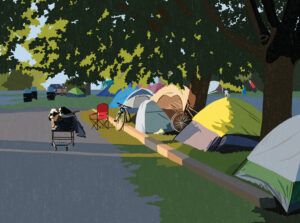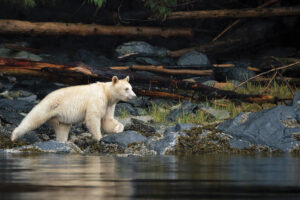
People & Culture
Kahkiihtwaam ee-pee-kiiweehtataahk: Bringing it back home again
The story of how a critically endangered Indigenous language can be saved
- 6310 words
- 26 minutes
This article is over 5 years old and may contain outdated information.
People & Culture

Photo: Milbry Polk
Ask Milbry Polk what she wanted to be when she was a child, and she’ll say it was exactly what she is today — an explorer.
Polk began her life of discovery and travel early, moving to Harvard, Mass., from England at two, then on to Egypt when she was fi ve, before making stops in Boston and Washington, D.C. From the age of 12, she spent summers in Egypt, where she lived with her Egyptian godfather in a mudbrick house in the desert, learning about her heroes, the British explorer Sir Richard Burton and Alexander the Great, and spending time with the Bedouin. By the time she was 17, she’d rafted down the Colorado River through the Grand Canyon and taken a guiding course in Alaska (she lied about her age to get in).
After graduating from Harvard with an anthropology degree, Polk found herself in New York City, where she volunteered at the American Museum of Natural History. It was there that she met Margaret Mead, the renowned anthropologist, who gave her some life-changing advice. “I was applying to graduate school to get my PhD and Margaret told me that I was wasting my time,” says Polk. “It was devastating to hear that at 21. I asked her what I should do instead and she said, ‘You already know what you want to do.’ ”
And she did. After her discussion with Mead, Polk contacted the National Geographic Society and eventually received support for a 1979-1980 expedition to retrace part of Alexander the Great’s famed route through Egypt. The trip spawned a series of adventures for Polk, who spent the next decade on expeditions in North Africa, the Middle East and Asia. During this time, she became a photojournalist and writer, and has since contributed to the Explorers Journal and a number of explorationrelated books, and co-authored Women of Discovery: A Celebration of Intrepid Women Who Explored the World.
In 2003, Polk co-founded WINGS WorldQuest, an organization that recognizes and promotes the discoveries and accomplishments of female explorers. “I founded WINGS,” she says, “because there were so many female explorers who needed that extra boost and weren’t getting it.”
Are you passionate about Canadian geography?
You can support Canadian Geographic in 3 ways:

People & Culture
The story of how a critically endangered Indigenous language can be saved

People & Culture
For unhoused residents and those who help them, the pandemic was another wave in a rising tide of challenges

Wildlife
How ‘maas ol, the spirit bear, connects us to the last glacial maximum of the Pacific Northwest

Places
In Banff National Park, Alberta, as in protected areas across the country, managers find it difficult to balance the desire of people to experience wilderness with an imperative to conserve it